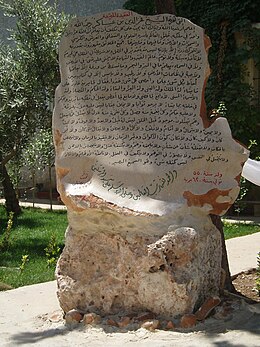Abū Manṣūr al-Baghdādī (أَبُو مَنْصُورالبغدادي) | |
|---|---|
| Title | Imam |
| Personal | |
| Born | c. 980 |
| Died | 1037 (429 AH)[1] (aged c. 56–57) |
| Religion | Islam |
| Era | Islamic golden age |
| Region | Khorasan |
| Denomination | Sunni |
| Jurisprudence | Shafi'i[1] |
| Creed | Ash'ari[2][3] |
| Main interest(s) | Theology (Kalam), Islamic Jurisprudence, Principles of Islamic jurisprudence, Arabic grammar, Mathematic |
| Notable work(s) | Al-Farq bayn al-Firaq Kitab Uṣul al-Din |
| Occupation | Theologian, Scholar, Jurist, Legal theoretician, Grammarian, Heresiologist, Mathematician |
| Muslim leader | |
Influenced by | |
Influenced | |
| Part of a series on |
| Ash'arism |
|---|
 |
| Background |
Abū Manṣūr ʿAbd al-Qāhir ibn Ṭāhir bin Muḥammad bin ʿAbd Allāh al-Tamīmī al-Shāfiʿī al-Baghdādī (Arabic: أبو منصور عبدالقاهر ابن طاهر بن محمد بن عبدالله التميمي الشافعي البغدادي), more commonly known as Abd al-Qāhir al-Baghdādī (عبد القاهر البغدادي) or simply Abū Manṣūr al-Baghdādī (أَبُو مَنْصُورالبغدادي) was an Arab[4] Sunni scholar from Baghdad. He was considered a leading Ash'arite theologian and Shafi'i jurist. He was an accomplished legal theoretician, man of letters, poet, prosodist, grammarian, heresiologist and mathematician.[5][6]
- ^ a b c d Gibb, H. A. R.; Kramers, J. H.; Lévi-Provençal, E.; Schacht, J.; Lewis, B. & Pellat, Ch., eds. (1960). The Encyclopaedia of Islam, Second Edition. Volume I: A–B. Leiden: E. J. Brill. p. 909. OCLC 495469456.
- ^ Anthony, Sean (2011). The Caliph and the Heretic: Ibn Sabaʾ and the Origins of Shīʿism. Brill. p. 72. ISBN 978-9004216068.
- ^ Adang, Camilla; Fierro, Maribel; Schmidtke, Sabine (2012). Ibn Hazm of Cordoba: The Life and Works of a Controversial Thinker (Handbook of Oriental Studies) (Handbook of Oriental Studies: Section 1; The Near and Middle East). Leiden, Netherlands: Brill Academic Publishers. p. 387. ISBN 978-90-04-23424-6.
- ^ "Al-Baghdadi biography". www-history.mcs.st-andrews.ac.uk.
- ^ Gibril Fouad Haddad 2015, p. 185
- ^ Böwering & Orfali 2015, p. 3